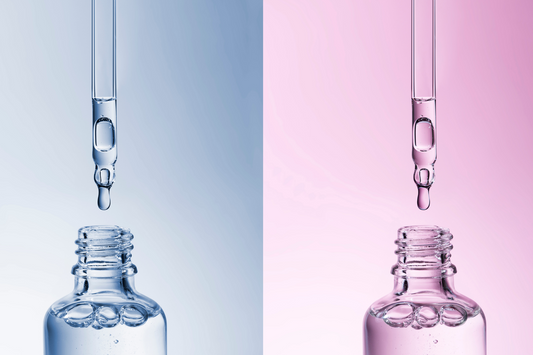If you’ve been experiencing hair loss and you’ve been looking for more natural ways to help trigger hair growth, you may have come across chlorophyll as a technique to help with hair growth. The question is whether or not chlorophyll actually helps – in this article, we’ll go into the details of does Chlorophyll really help hair growth, its potential benefits to help hair growth, and finally, other ways to help hair growth.
What is chlorophyll?
Chlorophyll is a natural ingredient in many plants and is what gives plants their green color. Plants get the nutrients they need by absorbing sunlight and turning it into energy in a process called photosynthesis. There are two types, chlorophyll a and chlorophyll b, and both can benefit your overall health in general (for instance, both chlorophyll a and chlorophyll b contain the properties of antioxidants.) However, chlorophyll’s health benefits elsewhere in the body don’t necessarily mean that chlorophyll will help with hair growth specifically. So does chlorophyll help with hair growth? At all?
Is it true that chlorophyll helps with hair growth?
There is no medical research that has come to an answer to whether or not chlorophyll helps with hair growth, so as for now, we cannot say it directly helps with hair growth. However, based on past research with the nutrients in chlorophyll (and plants), it does have beneficial properties, which, along with maintaining a balanced diet, can indirectly help with hair growth.
Chlorophyll and a balanced diet
As part of a balanced diet, chlorophyll can help you maintain good hair health. It does contain antioxidants to prevent aging, which can help slow hair loss caused by aging cells in the scalp. Chlorophyll supplements, also called chlorophyllin, contain magnesium and copper (depending on whether it’s type a or type b), two important minerals your body needs; hair growth and mineral balance throughout the body have been proven to be linked in research. However, because of the lack of research on chlorophyll’s benefits towards hair growth, it may be helpful to look into other natural methods of helping with hair growth besides chlorophyll.
Natural foods for hair growth
Ultimately, having a balanced diet is key for hair growth. Here are some ingredients to look out for that can encourage hair growth. All of these are natural ingredients and will help your body in ways other than hair growth, too! Consider including more of these natural ingredients and supplements in your diet:
- Biotin: Biotin is a B-vitamin clinically associated with hair growth; a study published results showing that women with low biotin levels were significantly more likely to experience hair loss than women with normal biotin levels. Biotin is also used in supplements for your nails and skin.
- Essential oils: Essential oils from plants like coconut, lavender, almonds, and rosemary can help soothe, moisturize, strengthen, and volumize your hair.
- Saw palmetto: This fruit from a palm tree native to the Southeast United States region has been proven to be effective towards helping hair growth by reducing DHT.
Conclusion
Chlorophyll lacks the clinical research needed to confirm whether or not it really does help with hair growth. However, it could potentially have an indirect effect. There are more proven natural supplements that may be more effective than chlorophyll, such as biotin, saw palmetto, and essential oils. But ultimately, the benefits of chlorophyll come down to having a healthy, well-balanced diet.
Another effective product that can help increase overall hair health and the appearance of hair volume is Revela’s Hair Revival Serum, which uses our breakthrough ingredient ProCelinyl to push dormant hair follicles to re-awaken and grow. You can learn more about it here.
References
- https://illuminatelabs.org/blogs/health/chlorophyll-benefits-for-hair
- https://www.naturallycurly.com/curlreading/ingredients/the-benefits-of-chlorophyll-for-your-hair-body-si
- https://www.webmd.com/diet/health-benefits-chlorophyll
- https://www.medicalnewstoday.com/articles/301506
- https://lpi.oregonstate.edu/mic/dietary-factors/phytochemicals/chlorophyll-metallo-chlorophyll-derivatives
- https://www.ncbi.nlm.nih.gov/pmc/articles/PMC4989391/
- https://www.webmd.com/beauty/natural-oils
- https://pubmed.ncbi.nlm.nih.gov/23298508/





